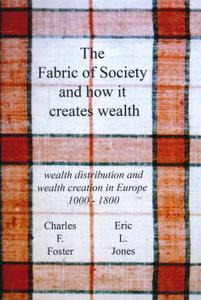Publications
|
Published by Arley Hall Press, Charles Foster's books are based on study of the Arley Hall archives and provide much background information which will make understanding the archives easier. The books are available mail order from this website. Newly released Charles Foster's new book The Flowers and Ashbrooks of Durrow is now available from this website as a downloadable PDF document. |
The Fabric of Society and how it creates wealth - Charles F Foster and Eric L Jones
Part One examines eighteenth century England, contrasting the south and east, which was dominated by rich gentry and aristocrats, with northern, especially north-western, England. In the south and east business enterprises were gently disappearing while the north -west, a community where wealth was relatively widely distributed, was bursting into action. In Part Two, the argument focuses on three areas in Europe that seem in turn to have led innovation in the world and made Europe the wealthiest continent by 1800. From 1000 AD the North Italian towns drove business throughout Europe in shipping, trade, textile manufacturing and banking. It would appear that a relatively wide distribution of wealth in those towns was an important ingredient in their economic growth. After 1350, as the money and power became concentrated in the hands of the big city oligarchies, they began to decline. The Netherlands, in its golden age from 1500 to 1700, has been labelled as the first capitalist economy. Again, a relatively wide distribution of wealth seems to have been an important characteristic of its economic success. Business vitality began to decay in the 18th century, when the wealth and reins of power were grasped by a few established families, leaving too little for the small innovators. North-West England, poor and marginalised in the Middle Ages, began to grow soon after 1500. The wealth generated there remained fairly widely distributed in the hands of many small to middling men, each with their own premises and enough capital to develop profitable technology, unlike Southern England where wealth gravitated to a few gentry families. By 1600 watch- and clock-making was beginning in the Mersey basin. By 1750, when printed cotton became hugely popular, this precision industry had developed sufficiently to supply men able to create new textile machinery to manufacture the vast quantities of cotton required. These men were part of a community of people who saw a life of successful business endeavour as one well spent, who thought competitively and were prepared and able to innovate, and they were the prime movers of the Industrial Revolution. Money, the authors argue, really seems to be like muck, and needs to be well spread to do most good. Cover: An eighteenth century Manchester cotton check In many ways this is an admirable and stimulating book, and the section (by Jones and Foster) on the build-up to the Industrial Revolution in England, which contrasts the south and east with the north and west, is especially valuable. In the south and east, dominated by gentry and aristocrats, business enterprises were gently disappearing, whereas the north-west where wealth was relatively widely distributed was bursting into action... ... In the later twentieth century there were many free-market economists who argued that rather more inequality would be good for economic growth. Today, doubts are beginning to emerge as wealth is funnelled from the middle classes to the mega rich and from the rest of the country to London. Foster and Jones have produced a timely case for a little more equality. Their fundamental thesis - that wealth is rather like muck and needs to be well spread to do the most good - is very convincing. John Clarke, University of Buckingham. Download the book This book is available to download free of charge in PDF format. Click download PDF to begin the download. The file is 2.8Mb in size.
|

 Is a wide distribution of wealth essential for economic growth? - an historical perspective.
Is a wide distribution of wealth essential for economic growth? - an historical perspective.